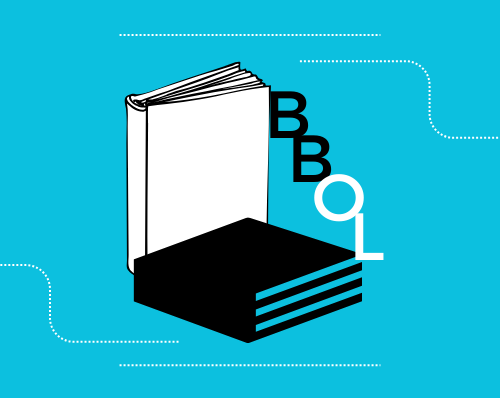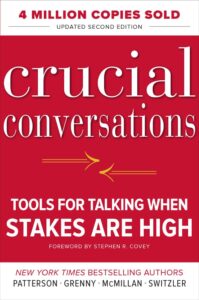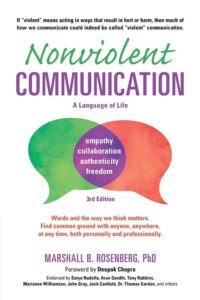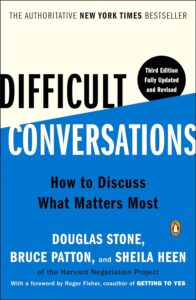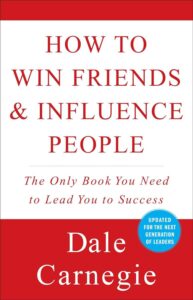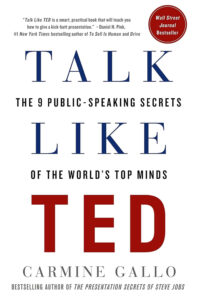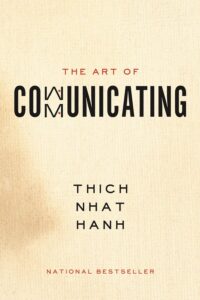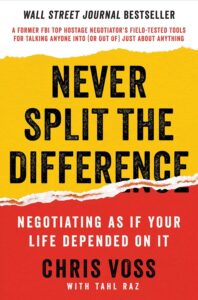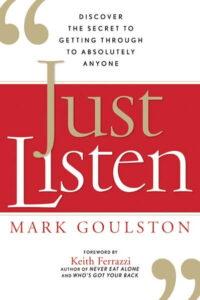Mastering communication is essential for success in both personal and professional settings. If you aim to improve your social skills, boost your leadership abilities, or become a more effective communicator, these best books on communication provide valuable insights and practical guidance.
1.“Crucial Conversations” by Kerry Patterson, Joseph Grenny, Ron McMillan, and Al Switzler
Overview: This book provides strategies for effectively navigating high-stakes conversations. It offers techniques for staying calm, creating a safe environment for dialogue, and achieving positive outcomes.
Why You Should Read It: “Crucial Conversations” is essential for anyone who needs to navigate difficult conversations with confidence and expertise. It offers practical tools for various situations, including workplace conflicts and personal disputes.
Key Takeaways:
- Techniques for staying composed under pressure.
- Strategies for fostering open and honest dialogue.
- Methods for resolving conflicts and reaching consensus.
- Tips for turning challenging conversations into productive discussions.
2.“Nonviolent Communication” by Marshall B. Rosenberg
Overview: Marshall B. Rosenberg presents Nonviolent Communication (NVC), a method designed to foster empathy and mutual understanding in conversations. The book teaches how to express yourself honestly and listen empathetically to others.
Why You Should Read It: “Nonviolent Communication” is perfect for those who want to enhance their communication skills by fostering compassion and reducing conflict. It’s a valuable resource for improving personal and professional relationships.
Key Takeaways:
- Principles of Nonviolent Communication.
- Techniques for expressing feelings and needs without blame.
- Strategies for empathetic listening and understanding.
- Tips for resolving conflicts peacefully.
3.“Difficult Conversations” by Douglas Stone, Bruce Patton, and Sheila Heen
Overview: This book offers guidance on handling tough conversations confidently and skillfully. The authors provide a step-by-step approach to addressing sensitive topics and finding common ground.
Why You Should Read It: “Difficult Conversations” is invaluable for anyone dealing with challenging discussions at work and personal life. It equips readers with tools to navigate these conversations constructively.
Key Takeaways:
- Framework for addressing difficult conversations.
- Techniques to manage emotions and reduce defensiveness.
- Strategies to achieve mutual understanding and agreement.
- Tips for effective communication in high-stakes situations.
4.“How to Win Friends and Influence People” by Dale Carnegie
Overview: Dale Carnegie’s classic book offers timeless advice on building positive relationships and influencing others. It covers fundamental principles for effective communication and interpersonal skills.
Why You Should Read It: “How to Win Friends and Influence People” is a must-read for anyone looking to improve social skills and build strong, positive relationships. The principles outlined in the book are easy to apply and highly effective.
Key Takeaways:
- Techniques for making a good impression.
- Strategies for winning people over to your way of thinking.
- Methods for handling criticism and fostering cooperation.
- Tips for building lasting, positive relationships.
5.“Talk Like TED” by Carmine Gallo
Overview: Carmine Gallo analyzes some of the best TED Talks to uncover the secrets of effective public speaking. The book provides practical tips for crafting compelling presentations and engaging audiences.
Why You Should Read It: “Talk Like TED” is ideal for anyone looking to improve their public speaking skills. It offers actionable advice based on real-world examples from successful TED speakers.
Key Takeaways:
- Creating engaging and memorable presentations.
- Connecting with your audience.
- Using storytelling and visuals effectively.
- Overcoming public speaking anxiety.
6.“The Art of Communicating” by Thich Nhat Hanh
Overview: Thich Nhat Hanh, a renowned Zen master, explores the principles of mindful communication. The book emphasizes the importance of speaking and listening with compassion and mindfulness.
Why You Should Read It: “The Art of Communicating” is ideal for those seeking mindful communication. It provides profound insights on connecting deeply with others and building meaningful relationships.
Key Takeaways:
- Principles of mindful communication.
- Techniques for speaking and listening with compassion.
- Strategies for reducing conflict and fostering understanding.
- Tips for building deeper, more meaningful connections.
7.“Never Split the Difference” by Chris Voss
Overview: Written by former FBI hostage negotiator Chris Voss, this book covers advanced negotiation techniques for everyday use. Voss provides strategies for effective negotiation, emphasizing the importance of emotional intelligence and active listening.
Why You Should Read It: “Never Split the Difference” is essential for anyone looking to improve their negotiation skills. It provides unique insights from high-stakes situations applicable to personal and professional negotiations.
Key Takeaways:
- Negotiation techniques for high-stakes situations.
- Active listening and emotional intelligence strategies.
- Tips for everyday negotiation.
- Methods for creating win-win scenarios.
8.“The 5 Love Languages” by Gary Chapman
Overview: Gary Chapman’s book identifies five primary love languages and explains how understanding and speaking your partner’s language can enhance your relationship. The book includes practical advice and real-life examples.
Why You Should Read It: “The 5 Love Languages” provides clear insights into how individuals express and perceive love, making it essential for couples looking to strengthen their bond and improve mutual understanding
Key Takeaways:
- Discover your and your partner’s primary love languages.
- Learn practical ways to express love effectively.
- Strengthen your relationship by meeting emotional needs.
- Improve communication and reduce misunderstandings.
9.“Just Listen” by Mark Goulston
Overview: Mark Goulston, a psychiatrist and business coach, provides techniques for connecting with others and building rapport. The book emphasizes the importance of listening and understanding others for effective communication.
Why You Should Read It: “Just Listen” is ideal for anyone looking to improve their listening skills and build stronger connections. It offers practical advice on how to get through to others and communicate more effectively.
Key Takeaways:
- Active listening and rapport-building techniques.
- Strategies for understanding and connecting with others.
- Methods for overcoming communication barriers.
- Tips for improving interpersonal relationships.
Additional Tips for Effective Communication
Active Listening: Listen carefully and attentively without interrupting.
Clear Communication: Be direct and straightforward in your messages.
Nonverbal Signals: Observe and use body language, eye contact, and facial expressions effectively.
Empathy: Understand and respect others’ viewpoints.
Constructive Feedback: Give helpful feedback and be willing to receive it.
FAQs
Q1: How do I choose the best book for improving my communication skills?
A1: Consider your specific needs and goals. “Crucial Conversations” and “Difficult Conversations” are excellent for handling difficult conversations. For enhancing empathy and understanding, try “Nonviolent Communication.“
Q2: Can these books help with professional communication?
A2: Yes, these books offer valuable insights and strategies for both personal and professional communication, including conflict resolution, public speaking, and relationship building.
Q3: Are these books suitable for beginners?
A3: Absolutely! These books offer practical, step-by-step guidance for both beginners and experienced communicators.
Conclusion
Effective communication requires a blend of knowledge, practice, and mindfulness. These books on communication provide the tools and insights you need to enhance your skills and build stronger, more meaningful relationships. By applying the principles and strategies from these books, you can become a more effective and compassionate communicator.
